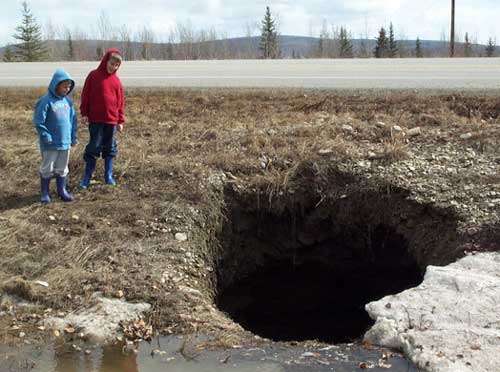 December 20, 2005
New NCAR simulations show that more than half the area covered by this topmost layer of permafrost could thaw by 2050 and as much as 90 percent by 2100. The study was funded by the National Science Foundation, which is NCAR'S primary sponsor, and the Department of Energy.  Photo courtesy Vladimir Romanovsky, Geophysical Institute, University of Alaska Fairbanks
The study, using the NCAR-based Community Climate System Model (CCSM), is the first to examine the state of permafrost in a global computer model that includes interactions among the atmosphere, ocean, land and sea ice, and a soil model that accounts for freezing and thawing. "People have used models to study permafrost before, but not within a fully interactive climate system model," said NCAR lead author David Lawrence. The study, using the NCAR-based Community Climate System Model (CCSM), is the first to examine the state of permafrost in a global model that includes interactions among the atmosphere, ocean, land, and sea ice as well as a soil model that depicts freezing and thawing. Results appear online in the December 17 issue of Geophysical Research Letters. About a quarter of the Northern Hemisphere's land contains permafrost, defined as soil that remains below 0 degrees Celsius for at least two years. Permafrost has an active surface layer that is from a few centimeters to several meters deep and thaws in summer and refreezes in winter. The deeper permafrost layer remains frozen. The active layer responds to changes in climate, expanding downward as surface air temperatures rise. Deeper permafrost has not thawed since the last ice age, more than 10,000 years ago, and will not be affected by global warming in the coming century, Lawrence said. Recent warming has degraded large sections of permafrost across central Alaska, with pockets of soil collapsing as the ice within it melts. Results include buckled highways, destabilized houses and forests whose trees lean at wild angles. In Siberia, some industrial facilities have reported significant damage. Further loss of permafrost could threaten migration patterns of animals such as reindeer and caribou. "Thawing permafrost could send considerable amounts of water to the oceans," says Slater, who notes that runoff to the Arctic has increased about 7 percent since the 1930s. In the high-emission simulation, runoff grows by another 28 percent by the year 2100. That increase includes contributions from enhanced rainfall and snowfall as well as the water from ice melting within soil. The study highlights concern about greenhouse gas emissions from thawing soils. Permafrost may hold 30 percent or more of all the carbon dioxide stored in soils worldwide. As the permafrost thaws, it could lead to large-scale emissions of methane or carbon dioxide beyond those produced by fossil fuels. The U.S. government has invested more than $5 billion in research for a better understanding of the causes of climate change and in advanced energy technologies to reduce the production of greenhouse gases. This study was funded by the National Science Foundation, which is NCAR'S primary sponsor, and the U.S. Department of Energy.
Source of News:
Submit A Letter to the Editor
|